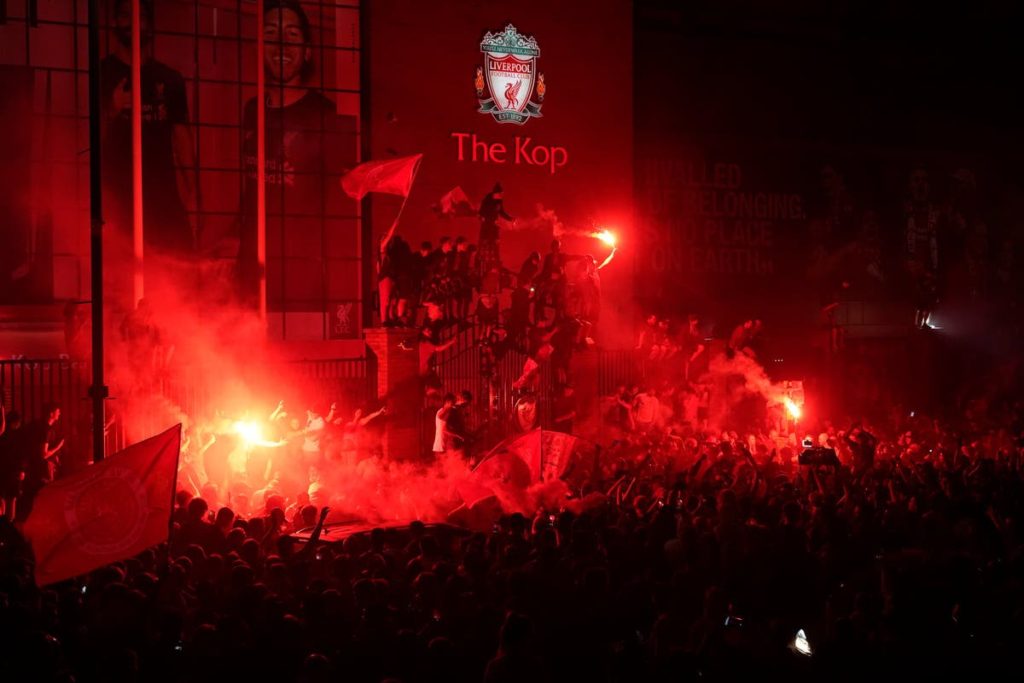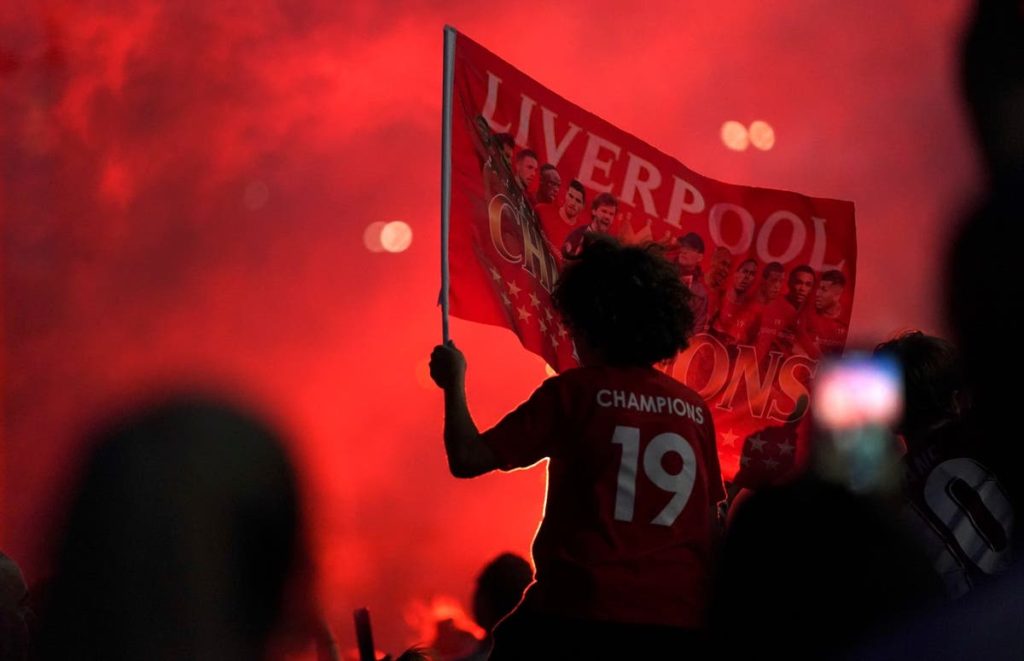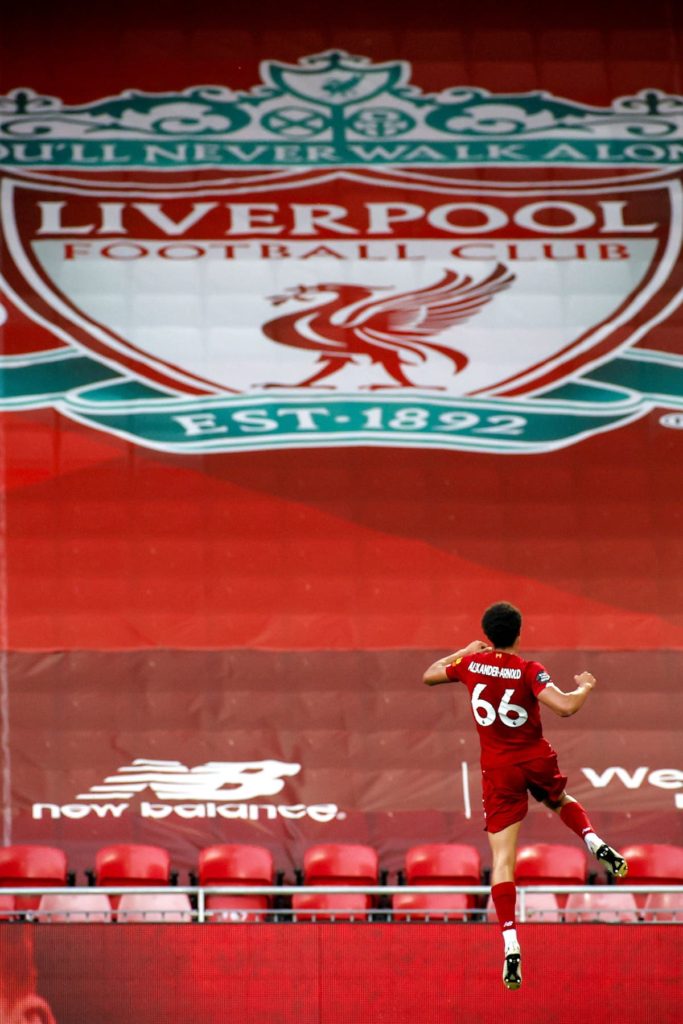Chelsea’s victory over Manchester City handed the trophy to Liverpool, which ended a 30-year title drought to cap the strangest of seasons.
LIVERPOOL, England — The first fireworks burst into the clear, still sky a few minutes early, a thud, a fizz and a crackle of what was to come. It had not happened — not quite, not yet — but after 30 long years, a little impatience was understandable.
A long, sultry day, the hottest of the year, had given way to a warm, quiet evening. The fireworks broke the peace, heralded the shift. Then came the car horns, blaring and echoing around empty streets, a joyous Morse code in their short, sharp blasts, summoning people from their homes, confirming that the moment had arrived.
In London, Chelsea had beaten Manchester City, 2-1. Liverpool’s lead at the summit of the Premier League had been first impressive, then daunting, then unimaginable. Now, at last, it was insurmountable. For the first time since 1990, Liverpool was champion of England.
And then, almost out of nowhere, the pilgrimage began. The tight streets around the club’s stadium choked with traffic. Flags fluttered from windows, scarves twirled above heads. Around them, the sidewalks were suddenly filled with people: hundreds and hundreds all of the same mind, all with the same destination, all drawn to Anfield.
They converged outside the Kop. They clambered up the Shankly Gates and along the wrought-iron railings, some with masks, but most without. They set off fireworks and smoke bombs, firecrackers and flares. The air grew thick with cordite. They sang of glories past and, with vigor and relish, they sang of glory present, the glory of the moment they had all awaited.
It was not, of course, quite as they imagined it, not quite how it was meant to be. That Liverpool would win the title this season has been all but certain for months: since Jürgen Klopp’s team went clear by beating Manchester City in November, maybe; since they dismantled Leicester City on Boxing Day, perhaps; since Mohamed Salah confirmed victory against Manchester United in January and even the Kop decided that it could afford to tempt fate.
All that has been left to decide was when, and how, the moment might arrive. For a while, Liverpool fans dreamed it might be on enemy territory, at Everton or at Manchester City, a dream and a nightmare all at once. Or perhaps it would be better for it to come at home, at Anfield, where the players could be with their people.
The pandemic, of course, changed all that. There would be no delirium inside a packed ground when the title was clinched. There would be no trophy parade, no garlands and confetti on the city’s streets. Whenever the title came, it would be celebrated without fans. Through the shutdown, through those long, fretful days when the possibility of the Premier League’s season being canceled entirely lingered in the spring air, it threatened not to come at all.

Liverpool’s league title was its 19th over all, but its first in the Premier League era.Credit…Jon Super/Associated Press
For all the relief of the restart, Liverpool — the club and the fans — knew they would be denied that moment. On Wednesday night, after Klopp’s team had produced a display of swagger and power and intent against Crystal Palace to move to the brink of the title, the German manager had daydreamed what it would have been like with fans inside the stadium: the delirium of the goals, the noise, the fervor.
Instead, the moment, when it arrived, was a fractured, distant one. Liverpool’s players were at a hotel in Formby, watching the Chelsea, Manchester City game together, counting down the last few seconds before the title was won. Liverpool’s fans were in their own homes and gardens, doing the same.
Perhaps, though, that was fitting. The history of Liverpool’s last three decades suggests that it could only, really, have won the Premier League like this: by producing a season so imperious it was all but devoid of drama.
Every other modern incarnation of Liverpool, after all, has fallen short. The youthful, homegrown team of the mid-1990s had brio and panache, but lacked grit and steel. Gerard Houllier’s obdurate, grizzled 2002 edition lacked imagination. Rafael Benítez’s finest effort in 2009 ran into a superior Manchester United.
Brendan Rodgers came close, his frenetic, flawed team denied by a single slip from its shot at history in 2014. Klopp’s altogether more finessed version seemed to have missed out last year thanks to the relentlessness of Manchester City.
That year, Liverpool became the only team to lose just one game in a season and not win the league. Only one team has ever lost just two games in a season and failed to win the league, too. There are no prizes for guessing its identity.
By definition, perhaps, Liverpool needed a season like this: one defined not by a single moment but constructed of a series of moments. A championship might be won in one game, but it is defined by a string of them, each one adding something to the glory. The championship is the journey, as well as the destination. As Óscar Washington Tabárez, the great Uruguayan coach, always said, “The journey itself is the reward.”

Trent Alexander-Arnold during Wednesday’s dismantling of Crystal Palace at Anfield. The 4-0 victory served as the penultimate step in its title chase. It had the day off for the final one.Credit…Pool photo by Phil Noble
That, in time, is how Liverpool fans will come to remember this title: not defined by the most recent memory, but by all of the memories that led to it, just as the Champions League victory last season is defined more by the defeat of Barcelona in the semifinal than the triumph against Tottenham a few weeks later. The last victory lends meaning; it is not meaning in itself.
That is what Liverpool’s fans came to celebrate, what drew them to Anfield: the season as a whole, not just its denouement. They should not have done that, really, either — both the club and the city’s authorities had asked them not to come, since social distancing rules remain in place, and large gatherings are still banned.
It should be noted that Liverpool’s fans are not the first group of people in Britain to decide that was really more of a guideline than a rule. A major incident had been declared at one beach on the south coast earlier in the day, after tens of thousands of people arrived for a day out.
It was not the moment they had wanted, but they were determined to celebrate the moment they had got. In the circumstances, too, maybe it was the most fitting moment: the title decided in a game no Liverpool fan would have attended anyway, a game where their absence was not so significant; the title won so comprehensively that Liverpool did not even need to play to claim it.
That is how it had to be. Perhaps that is how it ought to have been. Liverpool, this club that used to win titles by muscle memory alone, that tasted success so often it forgot to savor it, has waited a long time for this moment. In time, the realization will dawn that the moment arrived a long time ago. The wait is over. It has been over for months.
PHOTO CAPTION & CREDIT: Hundreds of fans ignored warnings from the team and fears of the coronavirus to gather outside the team’s stadium, Anfield. Christopher Furlong/Getty Images
The New York Times







